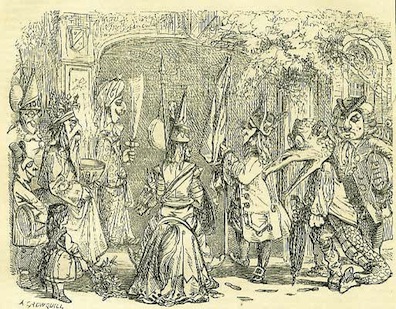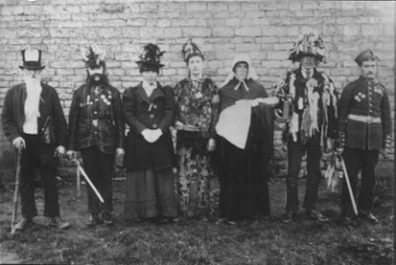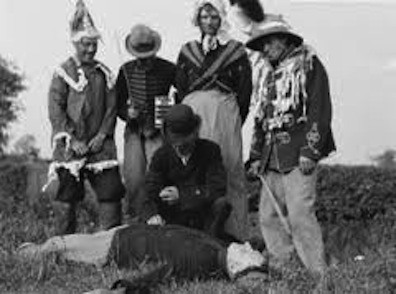In Telemachus and again in Scylla and
Charybdis Mulligan calls Stephen "A lovely mummer!...
Kinch, the loveliest mummer of them all!"; "O, you peerless
mummer!" Mummers were (and, in some places, still are)
impromptu comic actors who performed in the streets, in inns
and public houses, and in visits to private houses (just as
carolers and trick-or-treaters do). Their performances
typically revolved around a story of death and resurrection:
the young hero is killed, and a quack doctor revives him.
Mumming derived from secular folk plays in the Middle Ages,
related to other carnival rites like morris dances but distinct from
church-sponsored theatrical events like mystery plays. Begging
was often involved: performers would visit great houses,
usually just before or just after Christmas, expecting to
receive handouts. Masking too played a part: cognates of
“mummer” in various medieval languages (Middle English, Middle
Dutch, Early New High German, Old French) carried the
principal meaning of wearing a mask or disguise. These comic
performances were still going strong in the British Isles in
the late 19th and early 20th centuries, though the tradition
has weakened since then.
Mulligan feels an affinity for these impromptu clowners. In
Scylla and Charybdis he declares that "I have
conceived a play for the mummers," and launches
into the very funny title page of a lewd skit. The spirit of
mummery informs his comic performances in Telemachus
(the transubstantiation
of soap, the melting of
candles, the water-making of Mother Grogan and Mary Ann, the ballad of the Joking Jesus, the disquisition on Celtic antiquities)
and Oxen of the Sun (the fertilizing farm). It is
not so clear, however, why he would call Stephen a lovely
mummer. For most of the book Stephen is painfully serious.
Even the wry telegram that makes Mulligan call him "peerless"
shows little of Mulligan's genius for comic improvisation. The
flashes of humor that periodically break through the dark
clouds of Stephen's rumination are typically wry and
ironic—hardly the stuff to please a crowd.
With the onset of drunkenness
in Oxen of the Sun, however, Stephen becomes
funnier, and he taps the same comic veins that Mulligan
enjoys: blasphemous mockery of religion, and crude
celebrations of carnality. His wild ramblings in this episode
are quite cerebral (his audience is learned), and we hear them
filtered through the medium of the episode’s ornate prose
narration. But Circe gives us something closer to
his words as he performs a little skit for Lynch and the
whores. After Bella objects to some lewd jokes, Lynch says,
“Let him alone. He’s back from Paris,” and Zoe, “O go
on! Give us some parleyvoo.” “Stephen claps hat on
head and leaps over to the fireplace, where he stands with
shrugged shoulders, finny hands outspread, a painted smile
on his face,” and performs a very funny imitation of a
Parisian hawker enticing passersby to enter an establishment
and see a sex show.
This lewd performance may not correspond to any dialogue ever
heard in a holiday play, but it does display Stephen in a fit
of brilliant comic improvisation that might justify Mulligan’s
judgment that he is “a lovely mummer!” And,
intriguingly, Circe reaches its climax in a series
of events that reproduce the central action of many mummers’
plays: the death and resurrection of the hero. Stephen is
knocked flat on his back by a British soldier. As action
swirls over his prostrate body, the funeral home worker Corny
Kelleher, “weepers round his hat, a death wreath in his
hand, appears among the bystanders” and offers to carry
Stephen on the cart in which he has just ferried two lechers
to Nighttown. It appears finally that his assistance will be
unnecessary: “Ah, well, he’ll get over it. No bones
broken. Well, I’ll shove along. (He laughs) I’ve a
rendezvous in the morning. Burying the dead. Safe home!"
Stephen, then, escapes the honor of being ferried to Glasnevin
cemetery by Corny, as Paddy Dignam was on the morning of June
16.
In an unpublished doctoral dissertation (Purdue University,
1989) titled
James Joyce: “The loveliest mummer of them
all,” Frances Jeanette Fitch pursues a different
interpretation, suggesting that Stephen’s mumming is displayed
in his Shakespeare talk in
Scylla and Charybdis. She
also connects the tradition to Stephen’s name, observing that
December 26, the most common day for mummery in Ireland, is not
called Boxing Day in that country but... St. Stephen’s Day.


